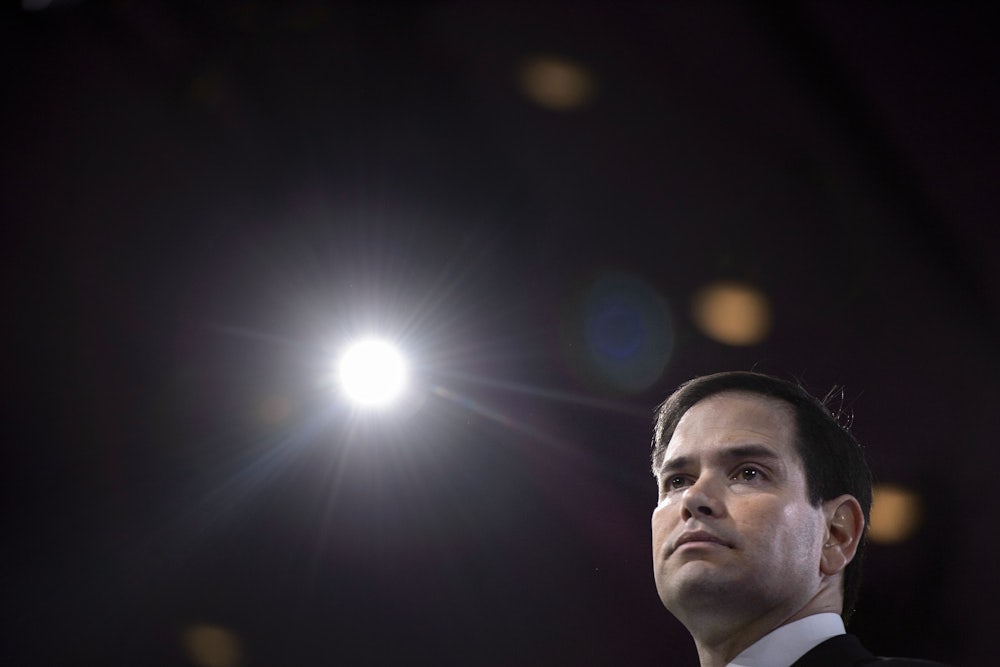When Marco Rubio finally won one of the Republican primary contests that took place this weekend, netting all of Puerto Rico’s 23 delegates, conservative social media became a hall of mirrors, challenging even some of its most regular visitors to distinguish between biting sarcasm and the grouchy, unembarrassed ignorance that has made it so difficult for Rubio to gain foothold throughout the campaign.
I wouldn't get too excited about Rubio's performance in Puerto Rico. They only voted for him because he promised them amnesty & citizenship.
— Jeff B/DDHQ (@EsotericCD) March 6, 2016
FWIW, Puerto Rico gets no electoral votes in general election. Win there is entirely insignificant except reinforcing Rubio's amnesty agenda
— Matthew Boyle (@mboyle1) March 6, 2016
To the untrained eye, these tweets are equally objectionable ways of saying the same, wrongheaded thing. But the first is from a Rubio supporter, baiting Donald Trump fans into showcasing their hallmark uncouthness and racism. The second is the genuine article: a Trumpista revealing that he either doesn’t know Puerto Ricans are U.S. citizens—that you can no more grant “amnesty” to Puerto Ricans than to Texans—or that he believes all brown-skinned Spanish speakers vote in a single-issue bloc.
Political Twitter makes it tempting to overgeneralize, but the right’s reaction to the Puerto Rico primary actually embodies one of Rubio’s central liabilities.
The backdrop for this weekend’s election is a crippling debt crisis that has generally pitted liberals, open to the idea of offering the island territory something akin to bankruptcy protection, against conservatives, who have generally rejected the notion of a Puerto Rico rescue as a bailout.
Conservative elites have rationalized their position in ways that conform to the polite strictures of National Review editorials—that a bailout would create a moral hazard, etc.—but it’s hard not to suspect that the GOP base’s unfriendly disposition to people they think of as foreigners is part of what’s driving Republican resistance.
This same antipathy explains why Trump supporters dismissed Rubio’s Puerto Rico victory the way they did, and why even Rubio supporters imagined that the right wing’s response would be a reflexive hostility to Hispanics.
For all his flaws, Rubio has generally avoided capitalizing on this specific kind of reactionary ignorance. But his narrow empathy didn’t distinguish him as an enlightened candidate of an evolving GOP. To the contrary, it has contributed, in undiscussed ways, to Rubio’s larger political difficulties, pitting the 44-year-old, amnesty-curious Cuban hip-hop fan against an aging, white, culturally terrified electorate.
Rubio’s reputation as a reformer is overstated. He famously abandoned his immigration reform legislation. The promise of his “reform” is to turn the GOP back toward George W. Bushism—a platform that included a pathway to citizenship for undocumented immigrants—but an exaggerated version of George W. Bushism that invests a cartoonish amount in border security, drops the investor class’s tax liability to a low of zero percent, and opens multiple new theaters of war.
Culturally, ethnically, attitudinally, he is a bad fit for convincing Republican voters to give that agenda a second look. To a population that conceives of amnesty as an unpardonable sin and that imagines Puerto Rico to be an island of hapless foreigners, Rubio’s success there merely confirms that his appeal isn’t to the median GOP base voter, but to a disfavored segment of society.
When he announced his candidacy, and for months thereafter, Rubio campaigned in a largely positive, if conventionally partisan way. I’m young, the Democratic nominee will be old. I’m the future, the Democratic Party is the past. I grew up poor, the Democratic frontrunner is obscenely rich. I can relate to people outside the Republican base, the Democrats are insular compared to me.
To young, cosmopolitan conservatives, and even to some liberals, this was a happy novelty in a field dominated by nativism, but it was a terrible recipe for winning votes in a Republican presidential primary. As Greg Sargent of The Washington Post noted, it helps explain why Rubio has been unable to connect on a gut level with working-class Americans who feel left behind. Trump, they feel, “has their backs,” Sargent wrote.
By the time Rubio recognized his weakness, darkened his tone, aped Trump, and found a political persona that was a better match for his electorate, it was too late. As you can see, he’s only popular among citizens who think he’s going to give them amnesty.
